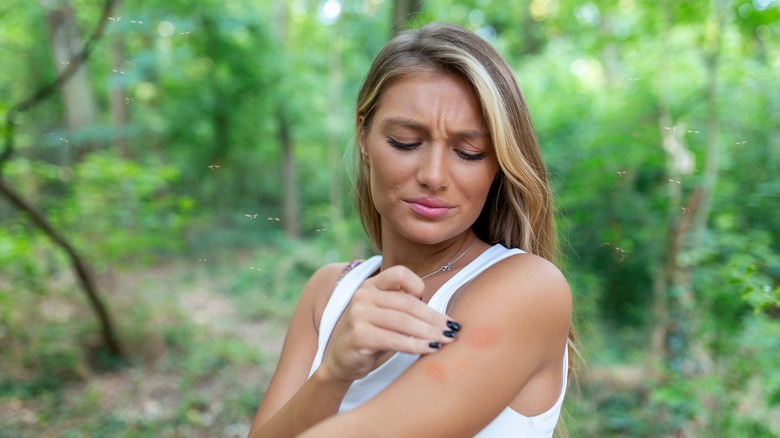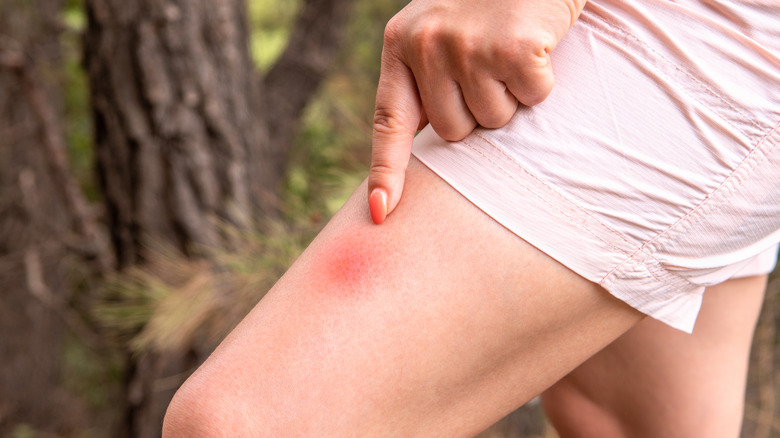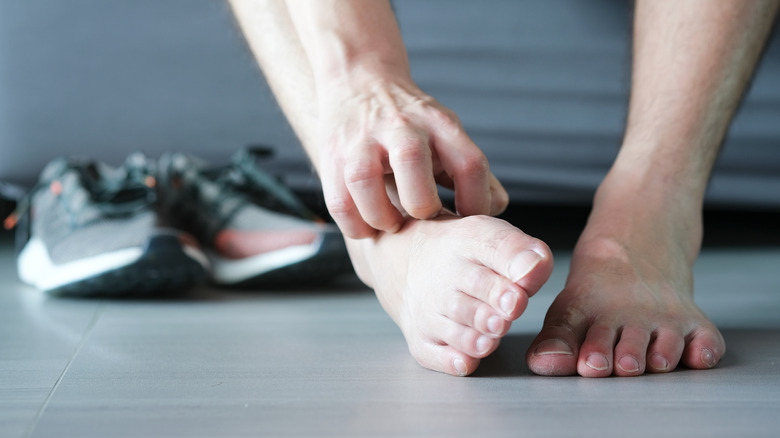What It Means When A Mosquito Bite Itches For Way Too Long
Mosquito bites are a universal experience. No matter where you live, when the hot season rolls around you're bound to get bitten by one — if not ten — mosquitos while you're out and about.
For some people, a mosquito bite is an uncomfortable, small itch that kind of swells up a little but dies down within a few days. But for others, the itch can last for several days (if not weeks), and the red bumps can turn into angry, inflamed welts. When you get a mosquito bite and find yourself dealing with an itch that just won't go away even after some time, it might mean that you're more allergic to the saliva that the mosquito has deposited in your system.
Yes, when a mosquito bites you, it doesn't just draw blood from you, but it also injects a bit of its saliva into your skin. The proteins found in the saliva are what cause your immune system to react the way it does — an itch and red bumps, per Centers for Disease Control and Prevention (CDC).
According to Professor of Neuroscience at Johns Hopkins Medicine, Xinzhong Dong (via The Healthy), when you're more allergic to this protein in the saliva, you end up with an itch that just won't go away. But a persistent itch could also mean that you have skeeter syndrome.
What is skeeter syndrome?
Skeeter syndrome is a relatively more intense reaction to mosquito bites. You might experience severe swelling, changes in skin texture, color, and temperature, itching, and pain in the bite area. These symptoms can come on within minutes of being bitten, according to Health. In some cases, you may even experience more serious reactions like a swollen face and limbs, bruising, blistering, fever, vomiting, and difficulty breathing.
Those who are more susceptible to developing skeeter syndrome include infants and children who've not developed natural immunity to mosquito saliva. It can also affect adults who are visiting a new region and haven't yet faced the kind of mosquitos that belong to that area, as explained by Everyday Health.
As severe as the possible symptoms sound, according to infectious disease allergist and immunologist at NYU Langone Health, Purvi S. Parikh (via Health), skeeter syndrome isn't as dangerous as bees and wasp bite allergies. "An allergist can diagnose it with a skin test in the office, but we can usually diagnose it clinically, as well. If someone comes in and their entire arm is swollen and red from a mosquito bite, it can be pretty obvious," she explained.
Constant scratching can actually make it worse
Remember that time when you just couldn't stop itching — and you ended up making things worse? This could also make discomfort from mosquito bites last longer than it should. "There's a theory that if you scratch the bite a lot, it damages the epidermis and you get a secondary infection," Dong explains to The Healthy.
You should take steps to prevent mosquito bites by avoiding going out between dusk and dawn (which is when they're most active), wearing mosquito repellent, and wearing clothing that covers all, if not, most of your skin. But attending to bites immediately after they happen can also help keep you from scratching a mosquito bite. Over-the-counter antihistamines help, but you can also turn to home remedies like cold-water compress, honey, rubbing alcohol, aloe vera, and even scotch tape to keep your fingers away. Assistant Clinical Professor of Dermatology at the University of Southern California in Los Angeles, Jessica Wu explains to Everyday Health, "Putting tape (or a bandage) on the bite will help remind you not to scratch, especially at night. If you scratch too hard, you could break the skin and introduce an infection."
If you notice significant redness even after four days, swelling, hotness of skin, fluid or pus drainage, or skin lesions, it is very possible that the mosquito bite has become infected, per Verywell Health. See a doctor who might prescribe oral antibiotics to treat the infection.



